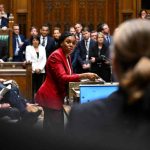[This post was co-authored with Seth Barrett Tillman]
Last month, a Manhattan grand jury indicted Donald J. Trump for violating state law based on alleged “hush money” payments to Stormy Daniels. Trump moved to remove that case to federal court. Trump’s lawyers invoked the federal officer removal statute. This statute allows an “Officer of the United States” to remove a prosecution from state court to federal court. But the former president can only remove the case to federal court if he was an “Officer of the United States.”
On Tuesday, Alvin Bragg, the New York District Attorney filed a brief in federal court opposing the removal motion. Bragg made various arguments for why removal was not proper. But the final section of the brief contended that Donald Trump, while serving as President, was not an “Officer of the United States.” Part IV of the brief (pp. 30) explains this position:
The arguments above defeat defendant’s attempt to remove this state criminal prosecution and require remanding this matter to state court. Although this Court need not go further, remand would also be independently mandated by defendant’s failure to establish that he was an “officer . . . of the United States” entitled to invoke removal at all under 28 U.S.C. § 1442(a)(1).
In construing a variety of other constitutional and statutory provisions, the Supreme Court has long interpreted “officer” to exclude the President and Vice President because those officials are elected to their positions rather than appointed. See Free Enter. Fund v. Public Co. Accounting Oversight Bd., 561 U.S. 477, 497-98 (2010) (“The people do not vote for the ‘Officers of the United States.'” (quoting U.S. Const. art. II, § 2, cl. 2)); United States v. Mouat, 124 U.S. 303, 307 (1888) (“[A] person in the service of the government” who does not “hold[] his place by virtue of an appointment . . . is not, strictly speaking, an officer of the United States.”). (emphasis added).
We are very sympathetic to this argument. Indeed, we have contended for years that the President is not an “Officer of the United States.” We made this point most recently two weeks ago on Lawfare. And on Lawfare, we observed that the District Court should call for the views of the Department of Justice. That observation is even more salient since Bragg stated that the Department of Justice shares his view that the President is not an “Officer of the United States.”
The Executive Branch shares this view. See, e.g., Memorandum from Antonin Scalia, Assistant Attorney General, Office of Legal Counsel, U.S. Dep’t of Justice to Kenneth A. Lazarus, Associate Counsel to the President, Applicability of 3 C.F.R. Part 100 to the President and Vice President 2 (Dec. 19, 1974) (“[W]hen the word ‘officer’ is used in the Constitution, it invariably refers to someone other than the President or Vice President. . . . This use of the word ‘officer’ in the Constitution has led the Department of Justice consistently to interpret the word [‘officer’] in other documents as not including the President or Vice President unless specifically stated.”) (Ex. 23). (emphasis added).
Tillman wrote about this Scalia memo in December 2016.
Bragg concludes:
The Court should therefore conclude—consistent with the views of the Supreme Court, the Executive Branch, and defendant himself—that the President is not an “officer” of the United States, and thus may not invoke federal-officer removal under 28 U.S.C. § 1442(a)(1). (emphasis added).
In the short-term, Bragg’s argument may harm Trump in the removal motion. If Trump is not an “Officer of the United States” for purposes of the federal removal case, then the criminal prosecution will remain in a New York criminal court. Indeed, the court could only grant the removal motion if it affirmatively finds that Trump was an “Officer of the United States.”
In the long run, such a finding, however, may have ramifications in the not-so-distant future. Specifically, Section 3 of the Fourteenth Amendment would only apply to President Trump if he took the presidential oath as an “Officer of the United States.” And we have written that the President is not an “Officer of the United States” for purposes of Section 3. If Bragg is successful here, and the federal courts adopt the argument that Trump is (or was) not an “Officer of the United States” for purposes of the federal removal statute, then that precedent could be cited by Trump in debates and litigation involving Section 3. Perhaps this potential for setting precedent on this issue is even more reason to call for the views of the Department of Justice.
There are many grounds on which the federal court can rule here. And certainly the federal district court might not reach the “officer” issue. Still, it may reach that issue, and for that reason, we will keep a close eye on this litigation in Manhattan.
The post New York District Attorney Bragg Argues That President Trump Was Not An “Officer Of The United States” appeared first on Reason.com.






